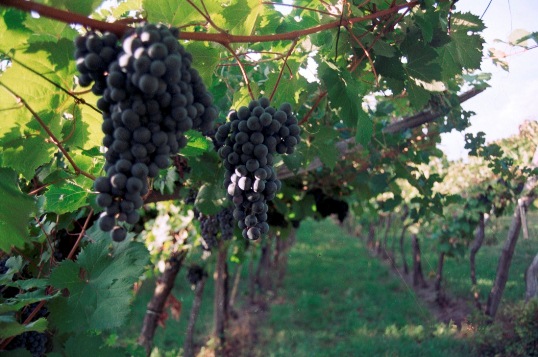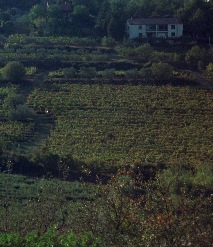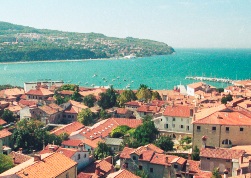
The wine began appearing outside my door soon after I moved into the ground floor studio apartment of the 700-year old Venetian building. Poured into reused plastic water bottles, the deep purple liquid needed no label to tell me the vintage. On the coast of Slovenia, there really is only one kind of red wine that darkens the lips of the locals -- Refošk.
These particular bottles were squeezed from the grapes at my landlords' farm outside Koper, where I was living. Klavdij Marancina and his daughter Dolores were not only proud Istrians, but true Samaritans. When I was homeless, they gave me shelter. When I froze, they gave me clothing. And when I could hardly afford a bite, they gave me sustenance -- and the wine.

Even before it began appearing, I'd already developed an intimate relationship with the grape. Destitution had driven me into the ripening hillside vineyards to feed myself on the hanging clusters, at least until the dogs or migrant workers chased me out.
The exceptionally fertile soil of the Primorska region has had a relationship with Refošk for millennia. The ancient Romans were particular fans. Then called puccinum, the variety attracted the attention of first-century naturalist Pliny the Elder, who praised the grape in his work Naturalis Historia. The grape's natural resistance to disease and rot also made it a favorite with farmers. Pop one into your mouth, and its strength becomes apparent in the dense, bitter-sweet punch to the palate.
Admittedly, Refošk's acerbic flavor isn't for everyone. The lingo-savvy experts at wine-searcher.com describe it as having "dark peppery spices and plums [and] a slightly astringent, almond-skin like finish on the palate." My significantly less-refined taste buds could discern little of this, but that wasn't the wine's fault. My Irish-Nordic ancestry had simply engineered my genetic receptors for beer and whiskey. Any estimation of wine quality pivoted on how little or much it burned my tongue.
My upbringing didn't help. Wine first entered my life in the form of cheek kisses from my grandmother, who drank it copiously, preferably white, and definitely cheap. The nascent revulsion was nurtured further by the culture of northern Vermont in the 1980s. Beer was the drink of choice, and wine reserved for elitist wussies and low-rent drunks--unless in "cooler" form, which appealed to hairspray-heavy backwoods girls called "chicken heads." The only other wine culture I saw was during mass, and that quickly changed to the blood of Christ.
 Years later, when I finally stepped foot in French wine country, my maladroitness led to one particularly embarrassing incident that significantly dissuaded future exploration. Uncorking a modestly expensive bottle of red wine at our table in the restaurant, the waiter poured a few splashes in my glass and stepped back. "That's all I get?" I roared in disbelief. The French burst out laughing.
Years later, when I finally stepped foot in French wine country, my maladroitness led to one particularly embarrassing incident that significantly dissuaded future exploration. Uncorking a modestly expensive bottle of red wine at our table in the restaurant, the waiter poured a few splashes in my glass and stepped back. "That's all I get?" I roared in disbelief. The French burst out laughing.
So when Refošk began appearing at my door in Koper, Slovenia, I was understandably cautious. First, there was a fear of not liking it and somehow spurning the Marancinas' tremendous generosity. But even more treacherous seemed the potential booby traps waiting in the tannins, all of which had haughty French accents. Happily, the wine's thick body roughly achieved beer weight and harbored a rough, roguish personality to match. Locals liked to soften the taste by adding Coca-Cola or dog rose-based Cockta to make a Bombus. The combo was remarkably delicious.
But as winter set in, it was the Refošk itself I wanted, ever purer and less-refined, not just for the fireside wine warmth and accompanying diffusion of worry, but rather the emotional support. Anyone who's lived thousands of miles from loved ones for long periods knows the depths of loneliness that sometimes arrive like the bora and blow you nearly to pieces. In these times, it's Wordsworth's "little, nameless, unremembered acts of kindness" that keep the heart pumping. The wine outside my door contained all three. By spring, the relationship had bloomed into love. However pleasing the body was, though, it was the spirit that won me. In short, I loved Refošk because Refošk loved me.
Back in America, years later, the thirst remains. Unfortunately, the wine business here sees little benefit in producing or stocking its shelves with Refošk or even its Italian counterpart, Refosco. Instead, the clerks at New York City's finest wine shops simply shrug their shoulders and offer to pursue a special order. But I decline. It's just not the same. Nevertheless, I continue to try, but I'm beginning to think that it's not really the wine I want, but rather a hug.
All photos by Mike Dunphy